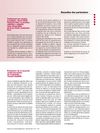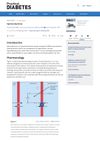Pump BioGro™️
Research
20 / 890 results
research Early and Midterm Outcome After Off-Pump and On-Pump Surgery in Beating Heart Against Cardioplegic Arrest Studies (BHACAS 1 and 2): A Pooled Analysis of Two Randomized Controlled Trials
Off-pump heart surgery reduces complications without affecting survival rates compared to on-pump surgery.

research Factors to Consider When Selecting Antiulcer Drugs for a Formulary
The document concludes that H2-antagonists and proton pump inhibitors are highly effective for ulcers, eradicating Helicobacter pylori is important to prevent recurrence, and misoprostol helps with NSAID-related ulcers.

research Insulin Pump Therapy: Accu-Chek FlexLink Plus, The First Self-Retracting Needle Catheter and Accu-Chek LinkAssist Plus
The Accu-Chek FlexLink Plus and Accu-Chek LinkAssist Plus make insulin pump use safer, simpler, and more comfortable.

research Spironolactone
Spironolactone helps reduce hospital visits and death from heart issues, lowers blood pressure, but has unclear effects on heart failure with normal heart pump function and can cause high potassium and breast enlargement in men.
research Case of Cronkhite-Canada Syndrome Shows Improvement with Enteral Supplements
Enteral supplements can improve symptoms of Cronkhite-Canada syndrome.

research Comprehensive Overview of Rheumatology Studies: Ottawa, Ontario, Canada, February 13–16, 2013
The document concludes that various findings in rheumatology offer insights into disease severity, treatment responses, and potential risks in medication, with some limitations due to unspecified participant numbers.

research Omeprazole-Induced Hypertrichosis in Two Children
Two children grew extra hair from taking omeprazole, which went away after they stopped the medication.
research Unexpected Hypozincaemia in a Patient with Discharging Empyema Resistant to Replacement Therapy
Zinc levels remained low despite treatment, likely due to absorption issues.

research An Unusual Case of Diarrhea, Dysgeusia, and Grainy and Nodular Mucosa
A 78-year-old man with Cronkhite-Canada syndrome improved significantly after treatment and remains symptom-free.
research The Resistance Mechanisms of Bacteria Against Ciprofloxacin and New Approaches for Enhancing the Efficacy of This Antibiotic
Combining ciprofloxacin with other treatments may improve its effectiveness against resistant bacteria.

research Selective Follicular Targeting by Modification of the Particle Sizes
Medium-sized particles penetrate hair follicles better than smaller or larger ones, which could improve delivery of skin treatments.
research Chronic Pancreatitis and Persistent Steatorrhea: What Is the Correct Dose of Enzymes?
Enzyme doses for chronic pancreatitis should match meal size, not patient size.
research Investigation of Differences in Follicular Penetration of Particle- and Nonparticle-Containing Emulsions by Laser Scanning Microscopy
Particles similar in size to hair cells penetrate hair follicles better.

research Inconsolable Crying in Infants: Differential Diagnosis in the Pediatric Emergency Department
Most inconsolable crying in infants is not due to a serious cause, and a detailed check-up is typically enough to find the reason.
research Barrett's Esophagus as a Premalignant Condition: Medical and Surgical Therapeutic Management
Early detection and personalized treatment are crucial to prevent Barrett's esophagus from becoming cancer.

research IoT Based Lavender Plant Monitoring System
The system helps lavender plants grow better by monitoring and adjusting their environment.

research Post-Implantation Erythema
Post-implantation erythema is a red skin condition after medical device implantation that sometimes goes away on its own.
research Esomeprazole-Induced Hepatitis
Esomeprazole can cause hepatitis.
research In Brief
Pilomatricomas don't follow the usual hair follicle cell differentiation process.
research Orders And Contracts
The method effectively delivers vaccines through the skin without needles.